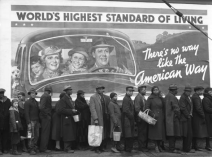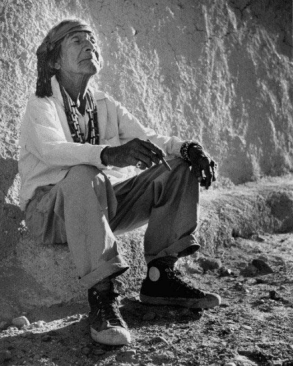| Category | Assignment | Subject | Sociology |
|---|---|---|---|
| University | University of Essex | Module Title | SC361-6-AU-CO American Society: Ethnic Encounters in the Making of the USA |
|
Module Code: |
SC361 AU |
|
Module Title: |
American Society: Ethnic Encounters in the Making of the United States |
|
Convenor(s): |
Carlos Gigoux |
|
Convenor(s) email(s) and office number(s): |
cgigou@essex.ac.uk |
|
Assessment: |
100% coursework |
|
Coursework and submission dates: |
Autumn Term Critical Reflection 1 (1,500 words) Deadline: By 10am Friday 7 November 2025 (Week 6) Critical Reflection 2 (1,500 words) Deadline: By 10am Friday 5 December 2025 (Week 10) |
|
Return of marked coursework: |
All marked coursework will be returned within 20 days after the submission deadline. |

Margaret Bourke-White, ‘World’s Highest Standard of Living’ 1937.
In this module, we will examine the social, political and economic encounters between European settlers, Native Americans, and African-Americans that have shaped the social and political development of the United States. The first term will primarily deal with social and political relations between the United States government and Native Americans. We begin with the early English colonisation of North America, proceeding with Westward expansion, and federal policies including moving Native Americans to reservations and removing children from their parents. We finish the term by looking at contemporary issues such as the industrialization of Native American landscapes, ill health and alcohol abuse on reservations, and the new and exciting social movements associated with Native American cultural revitalization.
Week Subject
2) Introduction: What is the Place of Native Americans in American Society?
3) Colonial New England: English Puritans and American
4) Westward Expansion 1 – The Frontier and Indian Removals
5) Westward Expansion 2 – The Clearing of the Great Plains
6) Westward Expansion 3 - An American Genocide in California
7) ‘Kill The Indian to Save the Man’: Assimilation Policies of the 19th Century
8) The Suppression of Native American Culture and Religion
9) Native Americans And Environmental Racism: Resource Extraction on Native American
10) Native American Health and Alcoholism
11) Native American Cultural Revitalization: Activism, Bison, Salmon and Seeds

We will start with an overview of the issues to be discussed and analysed over the term beginning with the establishment of the US as a colonial enterprise by English, French and Spanish invaders, but to do this we must consider what Native American societies were like before these invasions. I will also provide an interpretation of how European colonisation has both altered Native American life and shaped a distinct new society. The overview will also give students an overview of contemporary Native American circumstances and the place of American Indians within a global indigenous world.
James Wilson, (1998), ‘This is how it was: Two Views of History,’ in The Earth Shall Weep: A History of Native America, London: Picador, 3-15, Taiaiake Alfred and Jeff Corntassel, ‘Being Indigenous: Resurgences against Contemporary Colonialism’, http://www.corntassel.net/being_indigenous.pdf Colin Samson and Carlos Gigoux, (2016), ‘Colonization’ in Indigenous Peoples and Colonialism: Global Perspectives, Cambridge: Polity, 38-74.
The culture of the United States has been marked profoundly by early English colonization. It is important to know what happened in the 17th century to be able to put subsequent US history into perspective. In this session we will concentrate on the encounter that established the tone of ethnic relations for centuries in the United States.
Here we will consider the attitudes towards Indians held by the English Puritans, groups of religious zealots who left England to create the ‘New Jerusalem’ in North America, and their reactions to those native peoples whose lands they encamped upon. We will cover the constant displacement of Indians by the spread of English agricultural settlements, and the extremely bloody King Philip’s War that this precipitated.
WEEK 4 WESTWARD EXPANSION 1: INDIAN REMOVALS and WEEK 5: WESTWARD EXPANSION 2: THE CLEARING OF THE GREAT PLAINS
Territorial expansion has been perhaps the most powerful driving force in US history. Accelerating with the famous Lewis and Clark expedition into the Louisiana territory in the early 19th century, white Americans encountered American Indians on a vast scale as they pushed westward. In this session, we will explore some of the classic episodes in Euro-American expansion and examine them as they impacted upon Native Americans. One session will focus on Indian Removals, including the ‘Trail of Tears’ in the 1830s and the Navajo ‘Long Walk’ in 1864, and the second will look at the ‘Indian wars on the Great plains and slaughter of the bison. We will also try to understand how some explained the carnage that settlers left in their wake by appealing to ‘manifest destiny’.
Looking for expert help with your SC361-6-AU-CO American Society: Ethnic Encounters in the Making of the USA assignment? Our Online Assignment Help provides you with top-quality, plagiarism-free content tailored to meet your academic needs. We also offer a Free List of Assignment Samples to guide you in crafting your own assignments. Get the best support and achieve your desired results with our professional services.
Hire Assignment Helper Today!
Let's Book Your Work with Our Expert and Get High-Quality Content
